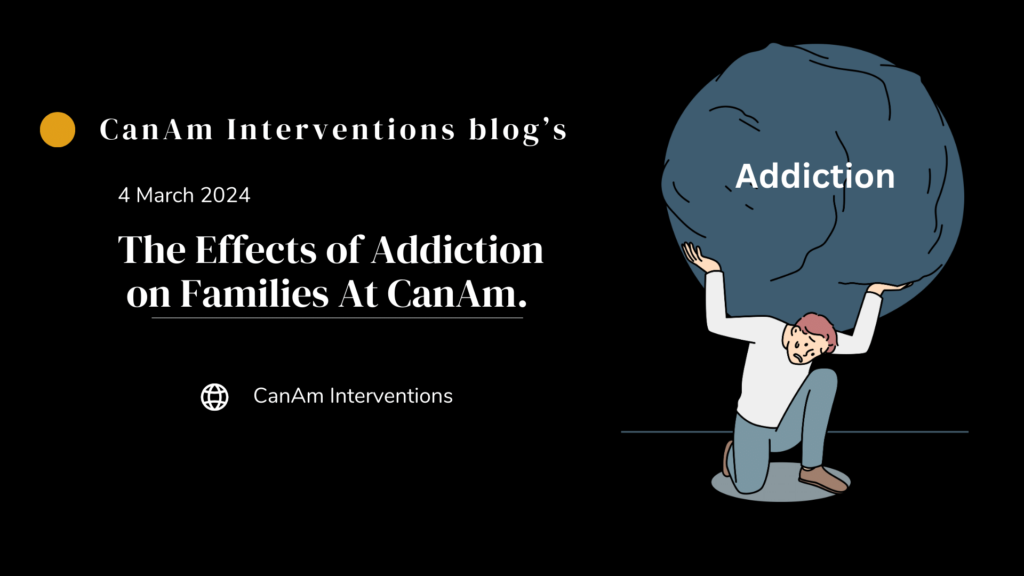Addiction is a complicated problem to live with for not only you, but also for the ones close to you. It affects everyone in the family and can affect them for the rest of their lives. These effects can be different for every person and every family. In the beginning stages of addiction, problems haven’t risen yet making it appear that things are going well. As time goes on, people may start to focus more on their using (like alcohol, drugs, or gambling) than they do in other parts of their lives. They may fall behind on bills or forget about obligations they have. Many things affect the process, including the person’s culture, genetics, mental health, and their relationships with family and friends.Addiction is a chronic disease that involves complex interactions between the brain, genetics, the environment, and someone’s life experiences. It can be treated. Can-Am Interventions would like to bring awareness to you about this common problem that frequently occurs in addiction(s)

How does addiction affect the family?
When someone in the family has an addiction, the whole family usually develops ways to cope with the problems the addiction causes. Often, there is less communication, the family doesn’t talk about it or show how they feel. They may keep the addiction secret from other family and friends. Some family members take on some of the responsibilities the person with an addiction has stopped doing or may provide financial support to the family member with an addiction.While these ways to cope may help the family work more smoothly and get along better, they may also let the addiction continue. Unfortunately, family members may also use alcohol, drugs, or gambling themselves as a way of coping with the problems in their family. A person’s addiction usually has a negative impact on the family, which can lead to conflict and fighting between family members. Family members can become stressed or anxious when dealing with the person using, which can negatively affect their own health.Family members often feel lonely, frustrated, afraid, angry, ashamed, or guilty. They may also feel that the situation is hopeless. It’s important for them to know that the addiction is not their fault. Finding professional support to guidethe addict and the family makes a major impacton the growth of their recovery.
How does addiction affect children?
The unmanageability of addiction may create an unstable family environment. Parents may not be able to parent as they should or provide basic necessities like proper food and clothing. Children may not be taught basic life skills. Children may feel insecure orunloved, and some may feel that the addiction is their fault. They may also begin to take on adult responsibilities that aren’t appropriate for their age. These children are more likely to skip school, have anti-social behaviours (like being aggressive), or have other unhealthy behaviours (eating disorder, shop lifting, bullying).Living with a parent who has an addiction isn’t easy for a child. The children are having to grow in an environment around unstable and dysfunctional parenting at such a critical time of growth for their maturity. The good news is that children can heal from these behaviors when the parent(s) go through their recovery process and then becomes recovery for the addict and the family.
How do I get help?
Addiction is a complicated matter for both the addict and their loved ones. To overcome addiction and achieve active recovery, having professional help is crucial. Many times, trying to fix the problem from within the family can make things much worse. It’s a complicated problem that needs to be handled with proper care to assure success. Can-Am has a pedigree of experience and success treating addiction, and working with addicts and their families to provide answers to their questions and concerns. We are here to guide the addict and family, and to facilitate a recovery plan that is suited for your situation. We will support you until you and your support network are ready to carry on independently. The beginning of your recovery is only a phone call away.
E: patti.pike@canaminterventions.com W:www.canaminterventions.com
1-800-638-1812 Toll Free Internationally
415-827-3725 Cell /Text
415-578-2875 Office